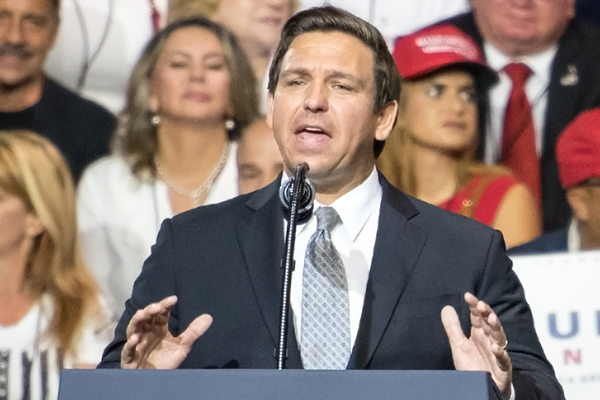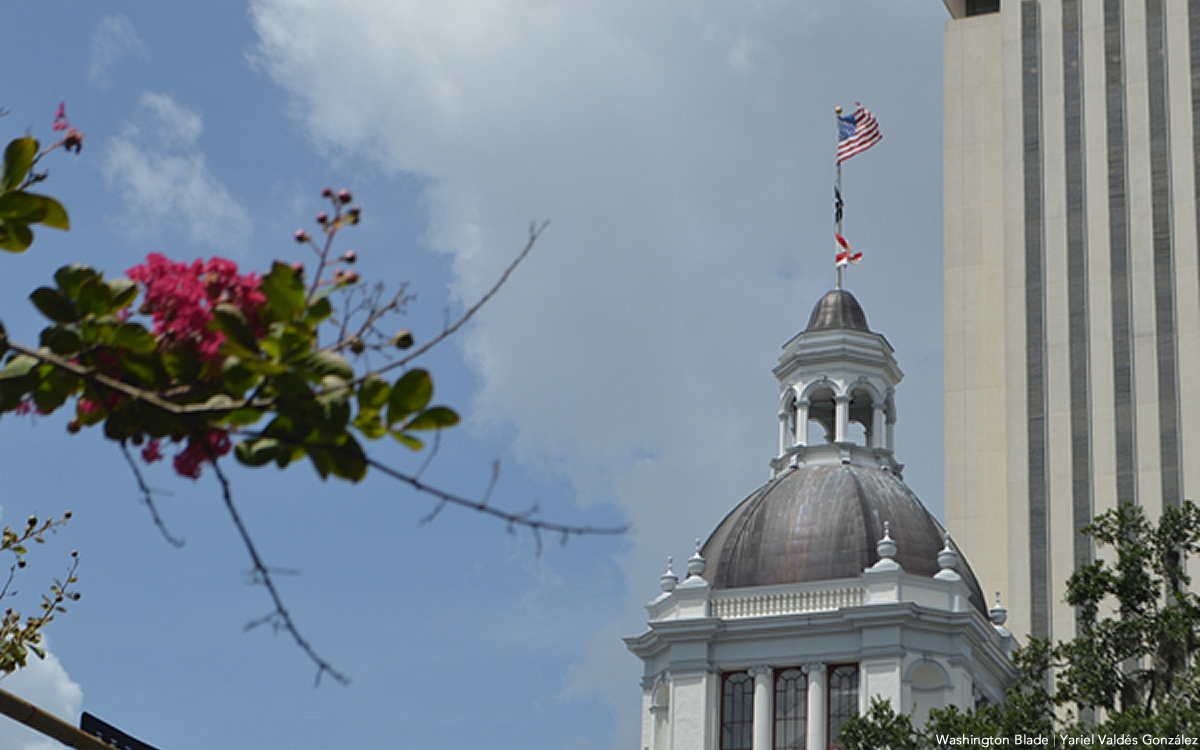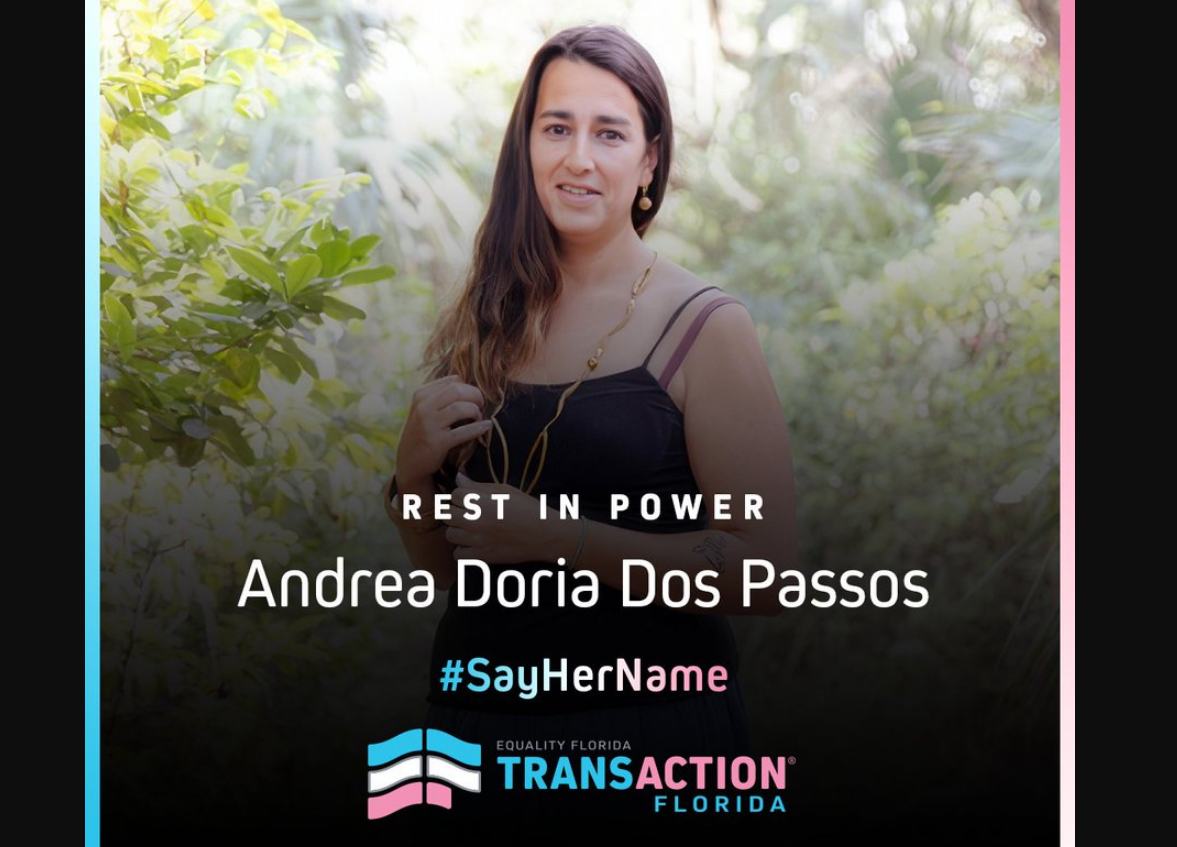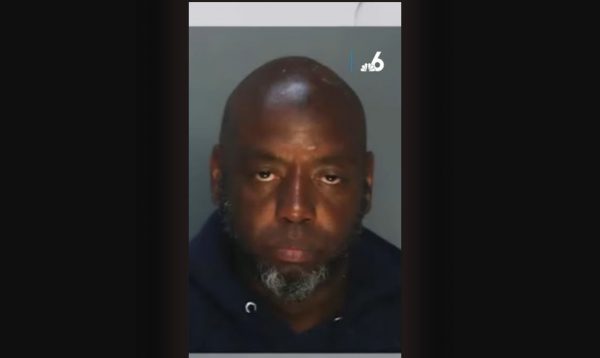Florida
Florida ‘Don’t Say Gay’ bill new focal point in battles on racism, politics
Republican Gov. Ron DeSantis widely seen as 2024 presidential candidate

Legislation in Florida known as the “Don’t Say Gay” bill, criticized as an effort to quash any discussion of LGBTQ families and identities in schools, has become a focal point of contention in the context of ongoing national battles over politics, critical race theory, restrictions on LGBTQ books and anti-transgender sports legislation in state legislatures.
The shock of the potential reach of the measure, which opponents say would make schools vulnerable to lawsuits simply over a teacher responding to a student’s question about a gay family member, followed by comments by Gov. Ron DeSantis signaling support for the bill, has opened up targets in other battles waged by the Democratic Party and progressives seeking attention for other issues and a potential upcoming challenger to President Biden in 2024.
Chief among the fiery battles for which the “Don’t Say Gay” bill has provided kindling is the upcoming presidential election. It’s no secret DeSantis is widely seen as a potential Republican challenger to Biden, who may be vulnerable amid consistently low approval ratings and criticism over his handling of inflation and coronavirus.
After DeSantis made comments last week favorable to the “Don’t Say Gay” bill, saying he thinks it’s “entirely inappropriate” for teachers to be having conversations with students about gender identity, his opponents were quick to take him task and tie him to the legislation. Although the legislation had previously faced criticism from Chasten Buttigieg, who tweeted the legislation “will kill kids,” among the new voices against the legislation were no less than the White House and Biden himself.
“I want every member of the LGBTQI+ community — especially the kids who will be impacted by this hateful bill — to know that you are loved and accepted just as you are,” Biden wrote in a tweet last week. “I have your back, and my administration will continue to fight for the protections and safety you deserve.”
Transportation Secretary Pete Buttigieg, the first openly gay person to obtain Senate confirmation for a Cabinet-level role, echoed his husband’s criticism of the bill during an appearance last week on CNN’s “Newsroom.”
When host Jim Sciutto asked whether the bill would inflict any potential harm the measure on LGBTQ kids, Buttigieg replied, “absolutely.”
“And the reason is that it tells youth who are different or whose families are different that there’s something wrong with them out of the gate, and I do think that contributes to the shocking levels of suicidal thoughts and suicide attempts among LGBTQ youth,” Buttigieg said.
The legislation hasn’t gone far in Florida.
As of this week, one House committee and one Senate committee have approved it and neither chamber has scheduled a floor vote. But with Republican in control of both chambers of the legislature and the governor’s mansion, the measure is well-positioned to become law.
A.G. Gancarski, a reporter with the news website FloridaPolitics.com, told the Washington Blade he could see the “Don’t Say Gay” bill coming up for a floor vote in the near future, pointing out “with these big social-message type bills, it seems like they do one a week in the House and the Senate.”
“It’s going to come up this session because it’s in posture where we’ll hit the floors probably toward the end of session — the last two weeks after committees, where things get kind of kind of crazy and things happen quickly,” Gancarski said. “We’re not there yet. We got plenty of time for this to get through the process, and there are no structural impediments to it. I can’t see what stops this is what I’m saying.”
One saving grace for opponents of the “Don’t Say Gay” bill is DeSantis has stopped short of committing himself to signing it. Gancarski drew a distinction between the support DeSantis has offered the bill compared his support for other bills, such a proposed bans on critical race theory.
“It’s something that Gov. DeSantis has not explicitly endorsed,” Gancarski said. “He hasn’t said, ‘I back these bills.’ Whenever he’s asked about these bills, he speaks conceptually supportive of them. This is true with CFO Jimmy Patronis also. So it’s something that Republicans on the executive level back, but it’s not one of those bills that DeSantis is putting the same emphasis on some other bills with his own name behind it, but he certainly backs it. He’s given every indication he would sign it.”
LGBTQ groups and commentators aligned with the conservative movement, sensing the legislation could become a political liability for DeSantis, were quick to defend the “Don’t Say Gay” bill.
Chadwick Moore, editor of Log Cabin Republicans’ media arm Outspoken, told Tucker Carlson last week on Fox News said the measure is “a perfectly reasonable, rational bill” being unfairly maligned by Democrats and “childish wacky gay activists.” Brad Polumbo, a gay conservative commentator, in a column for the Washington Examiner criticizes opposition to the legislation as “wildly overblown and not based in reality,” then undercuts his own argument by saying the “language is admittedly rather broad.”
Key portions of the legislation, numbered House Bill 1557 and Senate Bill 1834, reveal the potential penalty for the slightest hint of talk about LGBTQ kids and families in schools. The legislation is restricted to grade schools, although the bill never defines what constitutes a grade school from other places of education.
Under the legislation schools “may not encourage classroom discussion about sexual orientation or gender identity,” or generally in the education system “in a manner that is not age-appropriate or developmentally appropriate for students.” Further, the legislation empowers a parent of a student who feel the law was violated to “bring an action against a school district” in court to seek and obtain damages.
Another portion of the bill would give parents “access to information about their child’s mental and emotional well-being, as well as information about any changes to their mental or emotional health,” which critics could lead to teachers being forced to out LGBTQ kids still going through the coming out process to their families.
Equality Florida was out of the gate on Monday with a new TV ad against the “Don’t Say Gay” bill, which is the first of two TV against DeSantis’ policies.
The ad features a young girl in a school classroom about to give a presentation on her heroes, which she subsequently says are her two moms. A red light and buzzer goes off in the classroom, after which a teacher informs the students she should be proud of her two parents. The ad closes within a voice from an overhead, saying “please report to the front office.”
Although the “Don’t Say Gay” bill causing a stir at the national level, Gancarski said opposition to the legislation in Florida comes more from “people who don’t like the DeSantis agenda anyway” and the national outcry may not have the desired effect.
“That’s sort of the rub,” Gancarski said. “The more the White House pushes against DeSantis, the Republicans, the more they take that as validation of their approach. So when President Biden tweeted last week, he set himself up as a foil as the thing moves forward as much as anything vis-and-vis DeSantis-supporter Republicans. And that’s the paradox.”
‘Don’t Say Gay’ bill tied to ban on critical race theory
The “Don’t Say Gay” bill, amid an intense political discussion over topics discussed in schools, is not unlike other measures enacted in Florida and elsewhere seeking to curtail ideas the conservative movement has found objectionable, such as critical race theory or gender ideology. In addition to getting behind legislation against critical race theory, which remains pending before the Florida Legislature, DeSantis signed into law a measure prohibits transgender girls from participating in school sports.
As such, progressives see the fervor over the “Don’t Say Gay” bill as a means to highlight these related initiatives, encouraging the public to view them as one issue and part of a greater effort to further oppress marginalized groups, being clear to tie them all to DeSantis ahead of his potential challenge to Biden in the 2024 election.
Nadine Smith, executive director the LGBTQ group Equality Florida, said Monday in a conference call with reporters the “Don’t Say Gay” bill is part of a “roster of bills that chip away at freedom of expression, allow for surveillance in the classrooms, video monitoring, microphones on teachers to eavesdrop on their conversations with students.”
“They hide behind the guise of parental rights, but really when you read what these laws do they allow anybody in the community, regardless of whether or not they have a child, to challenge any resource and have it removed,” Smith said.
A second ad from Equality Florida unveiled on Wednesday called “The Content of Our Curriculum” against the Stop WOKE Act in Florida, which is the vehicle DeSantis to ban the teaching of critical race theory in school. The legislation, House Bill 7 / Senate Bill 148, among other things, would prohibit teaching members of one race are “morally superior” to members of another race, individuals are inherently racist because of their race or an individual’s “moral character or status” is privileged or oppressed because of race.
The “Don’t Say Gay” bill is also playing into the hands of critics who are decrying efforts to restrict pro-LGBTQ literature in schools and libraries across the country, many of them conservative states like Texas. According to a recent report in NBC News, hundreds of LGBTQ-themed titles have been pulled from libraries across the state for review, sometimes over the objections of school librarians. Many of these books are said to have sexually explicit content, although the Blade couldn’t immediately verify that claim.
George Johnson, who says their book on the Black queer youth experience “All Boys Aren’t Blue” is banned in 15 states, was on the conference call with reporters and said efforts like bans on books are the result of demographic shifts in the United States and the “conditioning of students’ minds.”
“The ultimate goal of book banning is to not just silence us,” Johnson said. “It’s not that they’re trying to say we don’t exist, it’s that the don’t want to condition Generation Z with the proper information about our existence, as well as information about the existence and history of this country. Because then, when Gen Z becomes the next CEOs, the next mayors and the next governors, they may actually think about people who are marginalized because they read about them growing up, because they knew them growing up.”
With state legislatures across the country advancing at a rapid pace bills that would prohibit transgender girls from participating in school sports, LGBTQ rights advocates are also drawing connections between the “Don’t Say Gay” bill and the anti-trans sports measures.
Mary Emily O’Hara, rapid response manager for the LGBTQ group GLAAD, said in the conference call in the national context, more than 170 anti-LGBTQ bills have been introduced throughout the country, many of which are focused on schools.
“There is no separating book bans from anti-trans sports bans in schools,” O’Hara said. “They both impact students. They’re both about lowering representation on the visibility and equality for LGBTQ students. There is no separating LGBTQ school policy bills from critical race theory bans.”
Florida
Federal judge blocks Fla. trans health care ban and restrictions
Republican Gov. Ron DeSantis plans to appeal ruling

BY JACKIE LLANOS | Florida’s ban on puberty blockers and hormone replacement therapy for transgender minors and restrictions for adults are both unconstitutional, a federal judge ruled Tuesday.
U.S. District Judge Robert Hinkle, who presided over the case in Tallahassee, sided with the plaintiffs in the class action — parents of trans minors and trans adults — who argued the measure violated the U.S. Constitution because it solely targeted trans people.
“The federal courts have a role to play in upholding the constitution and laws. The state of Florida can regulate as needed but cannot flatly deny transgender individuals safe and effective medical treatment — treatment with medications routinely provided to others with the state’s full approval so long as the purpose is not to support the patient’s transgender identity,” Hinkle wrote.
Those restrictions came into place following Gov. Ron DeSantis’ approval of Senate Bill 254 in May 2023 and promulgation of rules from the Florida Board of Medicine and Florida Board of Osteopathic Medicine enacting that law. Those boards and Florida Surgeon General Joseph Ladapo were named as defendants.
The measures banned minors’ use of puberty blockers and hormone replacement therapy, common treatments for gender dysphoria. Additionally, the law said only physicians, psychologists, and psychiatrists could treat adults seeking gender-affirming care, with the added requirements of frequent in-person visits, tests, and authorization through a consent form that contained false information about the harms of hormone replacement therapy.
However, the law didn’t impose the same restrictions on cisgender women needing to take testosterone or cisgender men needing to take estrogen.
Appeal incoming
The state plans to appeal the ruling, said Jeremy Redfern, press secretary to DeSantis. An appeal would go to the 11th U.S. Court of Appeals.
“Through their elected representatives, the people of Florida acted to protect children in this state, and the court was wrong to override their wishes,” Redfern wrote in a statement to Florida Phoenix.
“We disagree with the court’s erroneous rulings on the law, on the facts, and on the science. As we’ve seen here in Florida, the United Kingdom, and across Europe, there is no quality evidence to support the chemical and physical mutilation of children. These procedures do permanent, life-altering damage to children, and history will look back on this fad in horror.”
Redfern wrote that the state would continue to “fight to ensure children are not chemically or physically mutilated in the name of radical, new age ‘gender ideology.’”
In his 105-page ruling, Hinkle noted that “there were no complaints from patients, no adverse results in Florida, just a political issue.”
However, the ruling does not lift the state ban on gender-affirming surgery for minors and restrictions on surgery for adults. That’s because the plaintiffs didn’t challenge the statutes relating to surgery for minors, and the adult plaintiff had not sought surgery and so lacked standing to challenge those restrictions.
Relief for plaintiffs
Plaintiff Gloria Goe (they used pseudonyms to protect the privacy of their children) is the mother of an 8-year-old (at the opening of the case) trans boy. During the opening day of the trial on Dec. 13, she testified that she feared her son would be swallowed by depression if forced to go through puberty without medical treatment.
“This ruling lifts a huge weight and worry from me and my family, knowing I can keep getting Gavin the care he needs, and he can keep being the big-hearted, smiling kid he is now. I’m so grateful the court saw how this law prevented parents like me from taking care of our children,” Goe wrote in a press release.
Attorneys with GLBTQ Legal Advocates and Defenders, Human Rights Campaign Foundation, National Center for Lesbian Rights, Southern Legal Counsel, and the Lowenstein Sandler law firm represented the plaintiffs.
Hinkle compared the discrimination trans people face nowadays to racism and misogyny.
“Some transgender opponents invoke religion to support their position, just as some once invoked religion to support their racism or misogyny,” Hinkle wrote. “Transgender opponents are of course free to hold their beliefs. But they are not free to discriminate against transgender individuals just for being transgender. In time, discrimination against transgender individuals will diminish, just as racism and misogyny have diminished.”
Editor’s note:
In a statement made to the Los Angeles Blade after Tuesday’s rule, Shannon Minter, the legal director for the National Center for Lesbian Rights said:
“This decision is important because is the first federal court to rule on a law restricting healthcare for transgender adults and because it finds that Florida’s laws are plainly based on anti-transgender bias, not science. This victory shows that we can and must keep fighting these dangerous laws, notwithstanding the deeply flawed rulings of some conservative appellate courts.
Judge Hinkle ruled in favor of the transgender plaintiffs in this case even after the negative 11th Circuit ruling that reversed our initially successful challenge to a similar ban in Alabama. He was able to do so because the evidence showing that these laws have no medical justification and are rooted in false stereotypes and bias was so strong. This is a huge victory, and one that shows that we can win these battles even in red states.”
******************************************************************************************

Jackie Llanos is a recent graduate of the University of Richmond. She has interned at Nashville Public Radio, Virginia Public Media, and Virginia Mercury.
******************************************************************************************
The preceding article was previously published by The Florida Phoenix and is republished with permission.
The Phoenix is a nonprofit news site that’s free of advertising and free to readers. We cover state government and politics with a staff of five journalists located at the Florida Press Center in downtown Tallahassee.
We’re part of States Newsroom, the nation’s largest state-focused nonprofit news organization.
Florida
Homeless transgender woman murdered in Miami Beach
Andrea Doria Dos Passos attacked while she slept

Gregory Fitzgerald Gibert, 53, who was out on probation, is charged with the second-degree murder of 37-year-old Andrea Doria Dos Passos, a transgender Latina woman who was found deceased in front of the Miami Ballet company facility by a security guard this past week.
According to a Miami Beach Police spokesperson the security guard thought Dos Passos was sleeping in the entranceway around 6:45 a.m. on April 23 and when he went to wake her he discovered the blood and her injuries and alerted 911.
She was deceased from massive trauma to her face and head. According to Miami Beach police when video surveillance footage was reviewed, it showed Dos Passos lying down in the entranceway apparently asleep. WFOR reported: In the early morning hours, a man arrived, looked around, and spotted her. Police said the man was dressed in a black shirt, red shorts, and red shoes.
At one point, he walked away, picked up a metal pipe from the ground, and then returned. After looking around, he sat on a bench near Dos Passos. After a while, he got up and repeatedly hit her in the head and face while she was sleeping, according to police.
“The male is then seen standing over her, striking her, and then manipulating her body. The male then walks away and places the pipe inside a nearby trash can (the pipe was found and recovered in the same trash can),” according to the arrest report.
Police noted that in addition to trauma on her face and head, two wooden sticks were lodged in her nostrils and there was a puncture wound in her chest.
Victor Van Gilst, Dos Passos’s stepfather confirmed she was trans and experiencing homelessness.
“She had no chance to defend herself whatsoever. I don’t know if this was a hate crime since she was transgender or if she had some sort of interaction with this person because he might have been homeless as well. The detective could not say if she was attacked because she was transgender,” said Van Gilst.
“She has been struggling with mental health issues for a long time, going back to when she was in her early 20s. We did everything we could to help her. My wife is devastated. For her, this is like a nightmare that turned into reality. Andrea moved around a lot and even lived in California for a while. She was sadly homeless. I feel the system let her down. She was a good person,” he added.

The Miami Police Department arrested Gibert, collected his clothing, noting the red shorts were the same type in the video and had blood on them. Blood was also found on his shoes, according to police. He was taken into custody and charged.
“The suspect has an extensive criminal record and reportedly was recently released from custody on probation for prior criminal charges. Police apprehended the suspect in the city of Miami and the investigation is currently ongoing. This case is further evidence that individuals need to be held accountable for prior violent crimes for the protection of the public. We offer our sincere condolences to the family and friends of the victim,” Miami Beach Mayor Steve Meiner said in a statement.
Joe Saunders, senior political director with LGBTQ rights group Equality Florida, told the Miami Herald that “whenever a transgender person is murdered, especially when it is with such brutality, the question should be asked about whether or not this was a hate-motivated crime.”
Florida
Professor at Baptist university in Virginia found dead in Florida gay sauna
Orlando police say cause of death undetermined

A beloved professor of psychology at Averett University, a private Baptist university in Danville, Va., was found dead on March 16 of unknown causes at the Club Orlando, a popular sauna and bathhouse for gay men located in Orlando, Fla.
University officials said David Hanbury, 37, an Associate Professor of Psychology who taught at the university since 2015, was in Orlando attending a conference of the Southern Psychological Association and had initially been reported missing by family members before he was found deceased.
Orlando police told USA Today the cause of death had not been determined but the death “does not appear suspicious at this time.” USA Today reports that police said their investigation into the death was “active and ongoing.”
A spokesperson for the Orange County, Fla., Medical Examiner told the Washington Blade it would take about 90 days for the completion of blood work and toxicology tests to confirm the cause of death in a case like this, where there were no obvious signs of injury or illness.
Cassie W. Jones, Associate Vice President of University Marketing and Communications at Averett University, declined to disclose whether Hanbury self-identified as gay in response to an inquiry from the Blade
“As an employer, we cannot comment on our employees’ personal matters,” Jones said. But when asked if the university would have continued to treat Hanbury with respect and support his tenure at the university if he had come out as gay, she said “absolutely” in an email response to Blade questions.
“Dr. David Hanbury was a dear professor, colleague and friend whose influence was far reaching,” Jones said in a March 21 message to the Blade, “We send our affection, condolences, and prayers of support to Dr. Hanbury’s family, friends and all others upon whom he had a lasting impact.”
The Averett University website shows that it has a policy of nondiscrimination that includes the categories of sexual orientation and gender identity among other categories such as race, religion, and ethnicity. The website also shows that the university has an LGBTQ student group called the Gender and Sexuality Alliance or GSA group.
Jones said the admiration and longstanding support of Hanbury from his fellow professors and students was reflected in a March 18 memorial gathering for him on campus.
“Nearly 250 students, faculty, staff, and community members joined as one Averett family, united in grief and sorrow, as we gave thanks for the remarkable life and influence of Dr. Hanbury on our lives and on the University,” Jones said.
“Averett University is committed to inclusion and belonging for all who learn, work and visit our campus,” Jone told the Blade. “Openness and inclusivity are embedded in our institution’s core values, and we know our diversity makes us stronger.”
The Baptist Standard, an independent newspaper that reports on the Baptist Church, reported in a May 9, 2011, story that the Baptist General Association of Virginia severed ties with Averett University in 2005 over a disagreement with the university’s position on homosexuality. Other news reports at the time said the Baptist organization objected to the university’s support for a gay student group.
Jones, in her message to the Blade, said Averett University currently “is a part of the Baptist General Association of Virginia family of educational partners.” She added, “We are aligned in our commitment to meet students wherever they are in their faith journey, and welcome those of all faiths or no faith.”
-

 Virginia2 days ago
Virginia2 days agoDefying trends, new LGBTQ center opens in rural Winchester, Va.
-

 South Africa5 days ago
South Africa5 days agoLesbian feminist becomes South African MP
-

 Travel3 days ago
Travel3 days agoManchester is vibrant tapestry of culture, history, and Pride
-

 Opinions3 days ago
Opinions3 days agoUSAID’s demise: America’s global betrayal of trust with LGBTQ people














